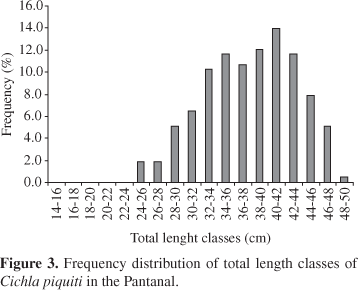The "tucunaré", Cichla piquiti, an exotic Amazonian fish has become established along the left bank of the Paraguay River in the Pantanal. It was introduced by escaping from culture ponds in the Upper Piquiri River and spread downstream, along the lateral flooded areas of that river, continuing through the clear waters of the left bank of the Paraguay River and reaching south as far as the Paraguai Mirim and Negrinho rivers. Adult spawners have been found in the region, meaning that it is a self-sustained population. Reproduction occurs in the period of low waters. They were found feeding on fishes of lentic environments belonging to the families Characidae, Cichlidae and Loricariidae. Until the end of 2004, its distribution was restricted to the left bank of the Paraguay River, but in March 2005, some specimens were found on the right bank, raising a question for the future: what will be the distribution area of the tucunaré in the Pantanal? Information about its dispersion is increasing: it is known to be in the Tuiuiú Lake, Pantanal National Park and in the Bolivian Pantanal, all of them on the right bank of the Paraguay River. The hypothesis that the "tucunaré" could not cross turbid waters, such as in the Paraguay River, was refuted by these recent findings. Possibly, the tucunaré's capacity to lay more than one batch of eggs in a reproductive period, as well as its care of eggs and young, lead them to establish themselves successfully in new environments, as has been observed in the Pantanal and other localities.
invasion; dispersion; reproduction; feeding









